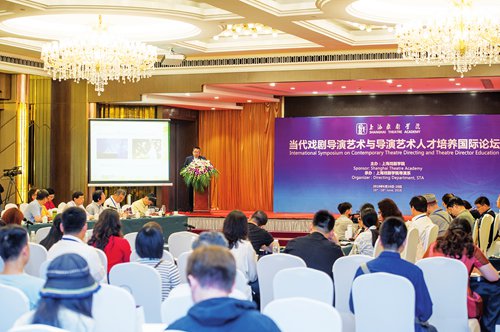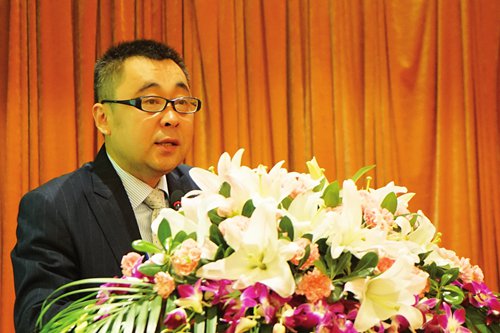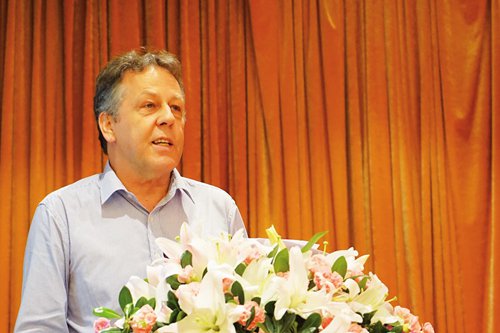The International Symposium on Contemporary Theater Directing and Theater Director Education was held on June 16-18 in Shanghai. Experts and scholars in this field from eight countries attended the event and exchanged viewpoints. Shanghai Theatre Academy (STA) was the sponsor and organizer of the symposium. This year marks the 10th anniversary of the International Master Class on Directing (IMCD) initiated and held by STA. IMCD is a pioneering global training system that introduces internationally distinguished theater artists for directing and acting to China. It serves as a long-lasting platform to enable collaboration between West and East. In the past 10 years, masters from the US, the UK, France, Russia, Germany, Oceania, Northern Europe, Southern Europe and the Americas have been invited to give lectures to Chinese directors.

Photo: VCG
In the opening speech given by the president of Shanghai Theatre Academy, Professor Huang Changyong pointed out that "We are in a new era as the country enters the prosperous stage. But in creativity areas including theater, film and TV, our imbalance is very significant in the social demand and supply of creative talents."
Huang added that "we are not only in bad need of scripts, plays and directors, but also choreography. The lack of talent is an omnipresent issue." Huang hopes that with more global cooperation, the practice of the International Master Class on Directing can solve the problem to some extent.
Tobias Biancone, the Director General of International Theater Institute, claimed that "all the educational endeavors that assist emerging stage directors to become outstanding stage directors are a very well invested initiative." Biancone asked: What are the challenges are we facing in educating young and professional stage directors today, and are we doing enough?
He answered that the challenges must be viewed in a globalized context. Today performances travel. Today, videos of performances can be watched on internet. This bears the risk that a stage director might think, it is better if I do my play how it is done in Germany or in Russia. This risk is inherent when stage directors are attending a master class given by foreign specialists here in Shanghai.
He gave practical solutions to the talent cultivation issue including: giving grants to stage directors to work for one year abroad as assistants of experienced stage directors at different renowned theater venues (as done by ITI Germany and Goethe Institute in the past); inviting masters not only once but give the students the opportunity to continue working with the same master again and again.
Additionally, inviting stage directors from abroad to work with students with the result of staging a production, for this project a local emerging stage director should be selected as an assistant; Giving grants to students to be able to study stage directing at another university abroad.
Window, bridge, platform
Professor Lu Ang, dean of directing department of STA, gave a 10-year summary on IMCD. He told the participants why and how he initiated the program 10 years ago. The objectives to achieve for IMCD: to prosper China's national theater; promote theater directors' comprehensive artistic accomplishment and widen their global vision; absorb the most influential and creative contemporary director.
Lu as the initiator of the IMCD shared with the audience the long and not easy way he tried to persuade internationally renowned big names to squeeze days to weeks to lecture in China. At the very beginning it was hard to convince foreign specialists that it will be an awarding journey to come to China. He used "Chinese stories inspired artists" repeatedly to make them nod finally although with hesitation.
But the foreign scholars and masters involved admit that the Chinese journey and experience inspired them in their future creation and achievement. The interaction with Chinese directors opens them another window of inspiration. With IMCD gaining reputation and recognitions in world stage, Lu and his team are thinking bigger for this project.
Lu reviewed that, over the past 10 years, an international hub and exchange and cooperation center for theater directing talents has been established. Over 60 internationally renowned theater directors have been successfully introduced in China. A 353-full-day training course has also been conducted, with 1,200 registered participants nationwide.
"IMCD is a window through which China and the world can mutually understand each other; it is a bridge where theater enthusiasts can gather here surmounting all barriers; it is a platform where the West and East meet, explore, experiment and create. I have reason to believe that IMCD can keep developing and making progress to be a lasting base to bring more wonders." Lu concluded his speech.
Voices from abroad
The theme of this year's IMCD is "ancient civilization." Between May 14 and June 19, five lecturers were invited to give students specific training. Hanan Snir, director at the National Theater Israel, brought with him "Acting in Vivo" or acting in the here and now.
Isil Kasapoglu, director at the National Theater Turkey came with A New Eastern-Western Synthesis - featuring the traditional Turkish theater, Meddah and Karagoz, whose roots have come from Asia. Kamaluddin Nilu from India, distinguished director and independent researcher, affiliated with Center for Ibsen Studies, University of Oslo brought with him "Caterpillar Transformative Game: Catalyzing energy for action through transmutable positions."
Assem Yehia Nagaty, Egyptian actor and stage director from the Higher Institute of Theatrical Arts, Egypt lectured on Imaginary Characters on Stage - A Midsummer Night's Dream. Mohammad Aghebati, Director and teacher of directing and theater history at Tehran University, lectured on "the Meeting of traditional Iranian Theater forms and contemporary theater."
Following Lu, Professor Zhang Zhongnian gave a speech of the STA characteristics on Theater Director Education. Scholars from Russia, Germany, the UK, Iran and the US shared the current situation in their home countries' director education.
Nikolai Pesochinskii, Head of International Department at Russian State Institute of Performing Arts delivered a speech on Russian Theater Directing and Theater Director Education. He recalled the hundred-year history of education system in his country. Hans-Georg Knopp from Germany, former Secretary General of the Goethe Institute and Director of House of World Cultures talked about Chinese contemporary drama and directors in his eyes.
Nicolas Barter from the UK, former principal of the Royal Academy of Dramatic Art shared British Theater Directing and Theater Director Education. Mohammad Aghebati from Iran shared Iranian ancient culture and the method of Iranian traditional stories stage narrative. Jose Luis Valenzuela, artistic director of Los Angeles Theater Center, head of the postgraduate directing program at the Theater Department at UCLA shared American Theater Direction and Director Education.
Counterpoint debate
Throughout the two-day event, various topics including the creation and expression of body, teaching methods of directing in universities, Chinese operas in the pursuit of modernity, rethinking on realism, the discovery and cultivation of music related theater directors were shared and discussed by participants.
Participants were encouraged to express different viewpoints and solutions to the problems and development of Chinese theater art. Hotly debated topics included traditional drama and modern theater and the existence of drama in the internet era. All participants admitted that traditional theater education and performance art face great challenges. The acceptance by modern theaters and the internet determine their survival and development.
The internet has changed almost every aspect of modern life worldwide, and theater art is of no exception. The general audience now has new options to appreciate art and performances. Internet celebrities also challenge traditional artists. Some scholars expressed mixed feelings toward them. Internet celebrities have nothing to do with serious art, they said, but they have a huge fan base and can make vast sums of money from their online performances.
Lei Guohua, a director based in Shanghai, told the symposium that now live streaming has also been applied in the official communication of serious performance. New technology has helped extend the limitation of the arts. But at the same time, Lei claimed that even in the internet era, all artists should keep in mind their artistic individuality, saying "that's the key factor and dignity of a real artist. Don't get lost by superficial online popularity."
Zhou Ke, with over 20 years teaching experience, said that in the internet age, people are more lonely than before. People in real life have deeper feelings for needing and being needed. In reality, eye contact and face-to-face communication have become rare. That is the true glamor of stage theater, where the audience can emotionally and physically connect directly with the artist. So long as artists have talent, skill and determination, they can still make the theater attractive against the digital background.

Photo: VCG

Guests at the event Photo: courtesy of Liu Jiaqi

Professor Lu Ang, dean of directing department of STA Photo: Feng Yu/GT

Tobias Biancone, the Director General of International Theater Institute Photo: Feng Yu/GT

